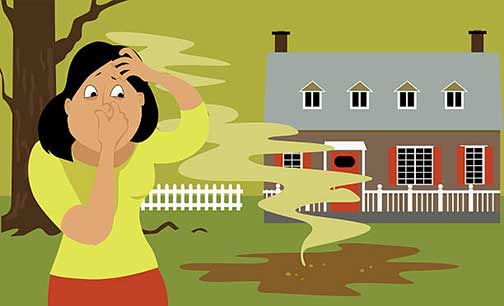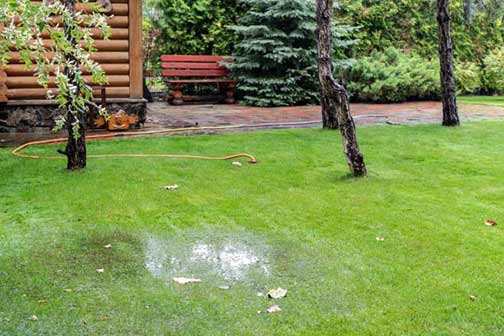
Home owners usually wake up to find themselves confronted with unpleasant smells in the plumbing system, and knowing where these sewer smells originate is key to successful repair. Sewer smells are brought about by a variety of causes, including dry traps, clogs, or breaks in the sewer pipe. These are all potential for letting gases such as hydrogen sulfide escape, which is infamous for its rotten egg like smell.
Most of these odors are caused by simple issues like water traps in drains and sinks drying out due to disuse. These traps are ingenious in that they hold water, creating a seal that prevents sewer gases from entering the house. When dried out, this seal is compromised, and the gases escape into living spaces.
Another likely reason for sewer smells is a clog in the plumbing system. Clogs could be due to trash, grease, or even foreign debris that plugs up the flow of water. If water cannot move as it should, it will cause pressure buildup and emission of unpleasant smells later on.
Common Pipe Problems Homeowners Have to Face: Weathering Plumbing Traps
Pipes are the arteries of any plumbing system, and they can cause homeowners lots of trouble. Common problems include corrosion, tree root penetration, leakage, and clogs. Clogs are caused by the accumulation of debris, grease, or foreign material that hinders water flow. Backups, slow drains, and ruptured pipes could follow if such blockages are not addressed promptly.
Corrosion is also a problem, particularly for older homes with old piping material. Pipes with time can corrode and lead to leaks and water damage. Corrosion is typically compounded by the existence of hard water that can accelerate the corrosion process.
Tree root intrusion is a natural but unwanted phenomenon where tree roots penetrate pipes in search of water, leading to clogging and structural compromises. The phenomenon occurs more in those households having older sewer lines composed of non root intrusion resistant materials, for instance, clay or cast iron.
Detection of Sewer Odors and Pipe Troubles: Early Detection Techniques
Early sewer odor and pipe problem detection can enable homeowners to circumvent costly repairs and long-term damage. The most critical indications include incessant smelly smells, gurgling sounds through drains, sluggish rates of water drainage, and leakages or eye visible water damage. Homeowners should also notice drastic increases in water bills, which could indicate a hidden leak within the system.
Daily monitoring of exposed pipes and plumbing fixtures can be helpful in diagnosing problems before they get worse. Homeowners ought to also observe any changes in water pressure or other sounds, which can be indicators of underlying issues. Observing the condition of the yard and landscaping can also provide hints of problems that may be happening with pipes underground, like unusual areas of dampness or excessively rich growth.

Preventive Measures to Avoid Sewer Odors and Pipe Problems: Proactive Home Maintenance
Prevention is more than cure, and there are certain steps home owners can follow to avoid sewer odors and pipe problems. Regular maintenance, i.e., hot water and vinegar flushing of drains, can avoid clogging. Ensuring water traps are full and functioning properly is another simple and good practice.
For more persistent issues, homeowners can also consider installing backflow prevention devices and regularly having your sewer lines camera inspected for root intrusion. Additionally, replacing aging pipes with new corrosion-resistant materials can nip many common issues associated with aged plumbing systems in the bud. The installation of water softeners can also minimize the effects of hard water and inhibit corrosion.
Practical Solutions for Fixing Sewer and Pipes: Real Methods
When sewer smells, pipe clogs happen, immediate and effective action needs to be taken so that there is not too much damage and the system can be made functional again. For minor clogs, homeowners can use plungers or chemical drain cleaners. However, for severe clogs, professional help must be availed. Plumbers use techniques such as sewer rodding or hydro jetting that can be utilized to clear blockages and recover normal flow.
In the case of pipe rupture or tree root intrusion, even more drastic repairs may be necessary. This can involve trenchless technology, through which pipes may be fixed or replaced with minimal disruption to the surrounding area. Trained plumbers can assess the degree of the issue and recommend the most suitable type of intervention, such that repair is done with effectiveness and efficiency.
Knowing About the Work of Professional Plumbers: Competence and Warranty
Trained plumbers play a significant role in the installation and maintenance of plumbing systems. They possess the know-how and the necessary tools to detect and repair complex sewer line issues. Engaging a professional plumber ensures problems are addressed properly and safely, reducing the chances of future complications.
Homeowners must choose qualified and experienced plumbers who work in accordance with trade norms and standards and regulations. A good plumber will have a thorough diagnosis of the issue, discuss potential solutions, and give a clear estimate of costs incurred. Furthermore, professional plumbers can offer relevant advice on preventive maintenance and system upgrade to maximize plumbing system efficiency and longevity.

Cost Factors and Budgeting for Plumbing Maintenance: Financial Planning
Plumbing maintenance and repairs can be very expensive, depending on the extent and type of issue. Owners of homes need to budget for maintenance to prevent getting stuck with hefty repair costs. Budgeting for money in hopes of eventual plumbing disasters is also advisable since they could happen at any time.
Identifying the cost effect of different repair methods can guide homeowners’ choices. While some solutions may be more expensive upfront, they can be cost-saving in the long run by eliminating repeated problems. Investing in quality materials and professional labor can also make the house more valuable.
Routine Plumbing Checks: System Integrity
Regular plumbing inspection is important to maintaining the integrity of a home’s plumbing system. Regular inspections are able to identify prospective troubles early enough to avert them becoming major issues, saving homeowners money and time. Inspections must also include water pressure checks, leak checks, and checking pipes and fixtures.
Home owners need to plan inspections every year or more than once if they reside in an old building or a location where plumbing is common. By being proactive, home owners can keep their plumbing systems in good shape and prevent the hassle and cost of unplanned repairs.
Adopting Contemporary Plumbing Technologies: Advances for Efficiency
The plumbing industry has seen significant technological advancements, offering homeowners more effective and efficient systems. High-tech leak detectors, low-flow fixtures, and trenchless pipe repair are some of the advancements that have revolutionized pipe repair and maintenance.
Homeowners would be well-advised to adopt these technologies in their plumbing system for enhanced performance and sustainability.
Smart leak detectors, for instance, will alert homeowners of potential leaks before they turn into expensive issues, while water-saving appliances will conserve water and dollars on the bill. Embracing such modern technologies can make a more sustainable and cost-effective home configuration.
Conclusion: Safeguarding Your Home’s Plumbing System for the Future
Understand sewer smells and fixing pipe issues are critical tasks for homeowners who do not wish to lose their properties. Without understanding why these problems happen, performing preventive maintenance, and utilizing professional help when necessary, homeowners risk having an unhealthy and non-working plumbing system.
Maintenance, inspections, and the implementation of new technologies will not only prevent problems but also optimize the overall value and habitability of a home. Homeowners can rest assured their plumbing systems are at the peak of performance with the right approach, ready to meet the requirements of daily life and future issues.

